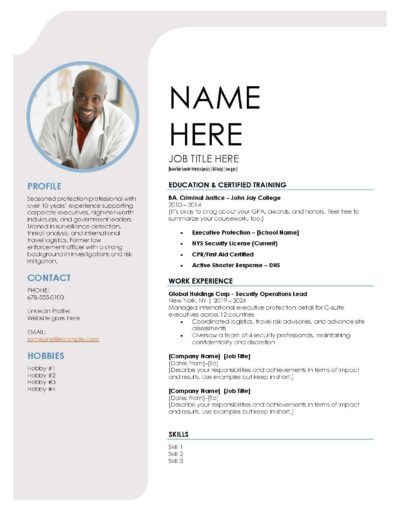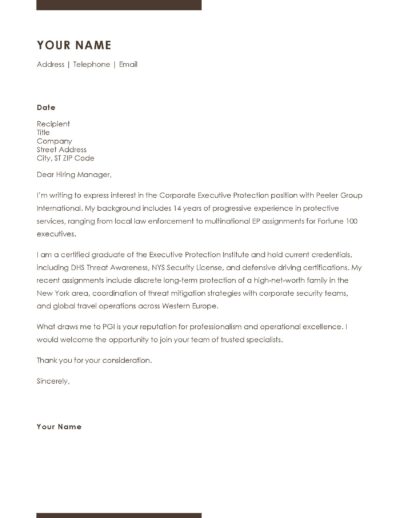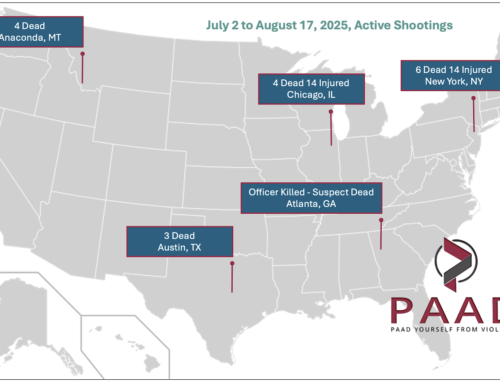At Peeler Group International (PGI), we receive dozens of applications weekly from individuals seeking roles in executive protection, threat mitigation, corporate investigations, and other specialized security functions. Yet many of these applicants, often talented and experienced, fail to position themselves in a way that communicates their true value.
A missed opportunity isn’t always due to a lack of skill; it’s often a failure to clearly demonstrate those skills in a format that hiring teams can understand quickly and effectively.
Let’s fix that.
🔍 The Core Problem: You’re Not Telling Us What We Need to Know
We often see applicants overlook the requirements of the role entirely. A position might ask for:
- Executive protection experience in corporate or international environments
- Discreet operations for high-net-worth individuals
- Experience with threat assessments or advance work
Yet we receive resumes from applicants listing only:
“Security Guard – XYZ Plant”
or
“Former Patrol Officer – Small Town PD”
While those experiences are certainly valuable, they don’t match the role as described unless you connect the dots for us.
In contrast, we sometimes see the opposite: a bland or vague resume from someone who actually has excellent experience, but buries it under generic descriptions.
✅ The Solution: Tell Us What You Did, How You Learned It, and Why It Applies
When we’re reviewing applications at PGI—or any top-tier security or investigation firm we’re looking for three things:
- What can you do?
- Describe your skill sets and operational competencies clearly. Example:
- “Conducted international advances and EP operations for tech executives across APAC and EMEA regions.”
- Describe your skill sets and operational competencies clearly. Example:
- How do you know how to do it?
- Don’t just list that you’re trained. Include your formal education, specialized training, certifications, and real-world experience. Example
- “Graduate – Executive Protection Institute, 2022. DHS Active Threat Certification. NYS Private Investigator License. 10+ years combined in military law enforcement and corporate risk roles.”
- Don’t just list that you’re trained. Include your formal education, specialized training, certifications, and real-world experience. Example
- Why does it apply to the job you’re seeking?
- Use your resume and cover letter to show alignment with the role. Hiring teams shouldn’t have to guess how your past applies to this new role; tell them directly.
📄 How to Write a Resume That Gets Read (and Gets You Hired)
Your resume should reflect intentional alignment with the job description. Not all your life’s experience, just the parts that matter most for this role.
🔹 Structure
- Header with Contact Info
Name, mobile number, email, LinkedIn
Use a professional email address (e.g., john.smith.protects@gmail.com)
DO NOT rely on job board messaging alone. Check your email regularly. If you miss a call, you might miss the opportunity.
- Professional Summary
3–5 lines that quickly summarize your expertise, credentials, and unique value
- Key Skills
Bullet points with hard skills, certifications, software, or languages
- Work Experience
Most recent roles first
Focus on relevant experience
Use action verbs and measurable outcomes
Don’t just say “provided security”—say what kind of security, for whom, and in what context
- Certifications & Training
List executive protection schools, firearm quals, CPR/AED, driving schools, surveillance courses, etc.
- Education
Degrees, majors, schools, dates
Mention if it’s relevant (e.g., Criminal Justice, Homeland Security)
✅ Sample Summary Section:
Protective Security Specialist | Executive Protection Agent | Risk Mitigation Professional
Former law enforcement officer and certified Executive Protection Specialist with over 12 years’ experience supporting C-suite executives, high-net-worth families, and public figures across North America, Europe, and the Middle East. Trained in surveillance detection, threat intelligence integration, and travel risk management. Maintains NYS PI license, DHS Active Shooter Certification, and has completed multiple international protection assignments.
✅ Sample Resume:

✉️ Writing a Cover Letter That Grabs Attention
A cover letter isn’t a repeat of your resume; it’s a personal pitch. This is where you connect the dots between your experience and the employer’s needs.
🔹 Use this format:
- Address the hiring team directly
- Say what role you’re applying for
- Explain what makes you a strong candidate—not just what you’ve done, but why it matters to this role
- Keep it concise and targeted
✅ Sample Cover Letter:

🧾 Completing Applications on Indeed (or Anywhere Else)
Too many applicants treat online applications as just another checkbox. That’s a mistake. Treat them like the first interview.
🔹 Key Reminders:
- Use a professional email address
- Clarify your role: If you’re an agency owner or business, make clear that you’re applying as a contractor, not offering your services to the agency
- Do not send “advisory” messages telling the company how you can help them improve—they’re looking to hire, not get unsolicited coaching
- Be responsive: If you’re contacted, reply promptly. Missing a single message or voicemail can end your chances.
📌 Tips for Contractors and Agency Owners
Many applicants are owners of small agencies or contracting entities. That’s fine—but be transparent:
✅ Say you’re seeking contract opportunities as an individual or team
❌ Don’t present your agency as if it is trying to coach, advise, or partner unless that was requested
✅ Be ready to follow the hiring agency’s SOPs, licensing, training, and reporting requirements
Remember: This is their contract—you’re looking to support their mission, not rewrite it.
💼 Final Notes for Applicants in Security & Investigations
- Relevance is Everything – If it doesn’t apply to the job, cut it or reframe it
- Presentation Matters – Clean format, easy to read, no typos or outdated info
- Follow Instructions – If the posting asks for a resume and cover letter, send both
- Be Honest, but Strategic – Don’t oversell, but don’t undersell either. Frame your experience effectively.
🔚 Conclusion: Your Presentation Is Your First Assignment
At PGI, we judge applicants not just by what they’ve done, but by how well they can communicate, adapt, and align with mission objectives—starting with their application.
Make it easy for us to say yes.





